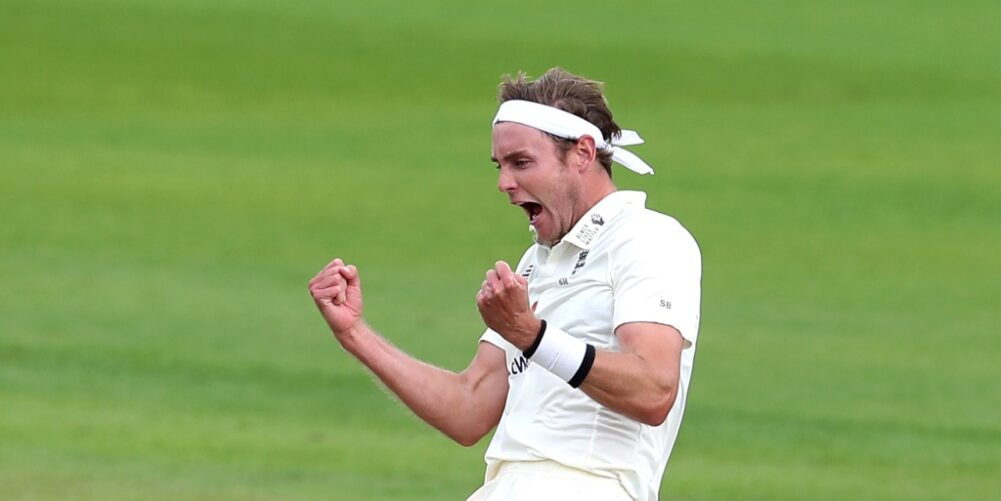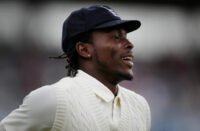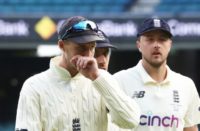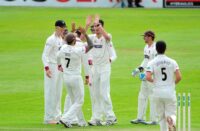The songs of praise from Sir Andrew Strauss and Sir Alastair Cook were full-throated and from the heart.
On the scale of Sir Stuart Broad’s magnificent achievement in joining Sir James Anderson in the list of Test bowlers who have taken 500 wickets, those two England batting greats and knights of the realm were unanimous.
Lauding the 34-year-old’s success in becoming the seventh bowler, and only the fourth paceman, to reach the half-thousand mark, Strauss said: “There have been so many bowlers whose star has shone for a year or two then either they have been worked out or their confidence has deserted them and they’ve been cast aside.”
Cook said: “People had been writing him off. A couple of years ago people were saying: “When’s he finishing? It must be a great feeling for him that he can lie in bed at night knowing that when it gets tough he delivers.”
And what, dear readers, is wrong with this description?
No prizes, just the joy of sharing the reminder that cricket is, always has been, and surely must stop being a batsman’s game.
Of the 14 England cricket personalities who have felt the sword on the shoulder nine have been batsmen, two all-rounders (Gubby Allen and Ian Botham) one a cricket writer, the wonderful Sir Neville Cardus, knighted for services to music and cricket journalism and one, Sir Frederick Toone, a highly-respected administrator who, like Cardus, never actually played first-class cricket at all.
Set aside England batsmen Francis Lacey, Pelham “Plum” Warner, Jack Hobbs. H.D Leveson-Gower, Len Hutton, Colin Cowdrey, Cook, Geoffrey Boycott and Strauss, their various majesties have seen fit to dub one out and out bowler, just one, the redoubtable Alec Bedser.
And while you may well have heard this before it is well worth repeating that on hearing that Don Bradman was to be so honoured, Bedser remarked that the last England bowler to be knighted was Francis Drake.
Whether sportsmen and women should be knighted at all is a moot point. Why should anyone be rewarded in this way for simply doing their job well?
It’s also true that cricketers have usually had to wait until the end of their career before such an accolade is conferred, some, like Bedser himself and Boycott, longer than others, for quite different reasons.
Furthermore, your best chance of picking one up is to be the captain of an Ashes-winning side, preferably two and if you pull it off Down Under all bets are off.
As recent history shows us, bowlers need not apply for that job.
But if sportspeople in general and cricketers in particular are to be so honoured, why delay a moment longer a double award for England’s most successful Test bowlers of all time?
There is no doubt that Strauss and Cook earned their knighhoods, for their runs, their leadership and for having to cope with years of you-know-who.
But 500 Test wickets for a bowler, and a pace bowler at that, is something else entirely, an achievement so stratospheric not just because of the level of skill it reflects, but also the sheer bloody hard work and physical, emotional and professional commitment required to get to the top, to stay there and to keep one step ahead of the opposition, the competition and the clock.
There was a case for inviting Anderson to bend the knee five years ago when, in April 2015, his dismissal of Dinesh Ramdin in the first Test against West Indies in Antigua took him past Botham’s 383 to become the highest England Test wicket-taker.
There was an even stronger case a month later when he sent back to the Lord’s pavilion New Zealand’s Martin Guptill, his 400th Test scalp.
Surely the 500th could not go similarly unsung, but he reached the magic number by getting out Kraigg Brathwaite (and what a fabulous coincidence he should also be Broad’s 500th) the best part of three years ago, in September 2017, and still no sound or sight of a royal blade, which makes one wonder just how many more wickets he will need to add to his current total of 589 to be considered worthy of it.
That’s not to say no honours have come his way, of course.
Anderson’s first major non-cricketing plaudit (and arguably his proudest to date) came in December 2011, when the ‘Burnley Express’ was awarded the Freedom of the Borough of Burnley and, in fairness, moving past Lord Beefy’s record did earn him an OBE in the Queen’s Birthday Honours.
And such was the outpouring of national relief in the summer of 2005 when England finally beat Australia for the first time in a million years, he might even have picked up an MBE had Michael Vaughan preferred him to Paul Collingwood to replace the crocked Simon Jones in the final Test at The Oval.
As the Durham man’s contribution to the greatest Ashes series ever played was 17 runs in two innings and one bowling spell of 0 for 17 from four overs, you could see why, the next time they played against each other, on the 2006/07 tour down under, Shane Warne found it impossible to resist asking: “MBE, mate? What’s that stand for? Must Be Embarrassing? ”
Some might say those words ring a bell now, too.
So, with all due respect, ma’am, prove cricket doesn’t have to be a batsman’s game and give knighthoods to James Anderson and Stuart Broad, please.
It’s time to correct the picture. It’s time to bang the gong.
PETER HAYTER












